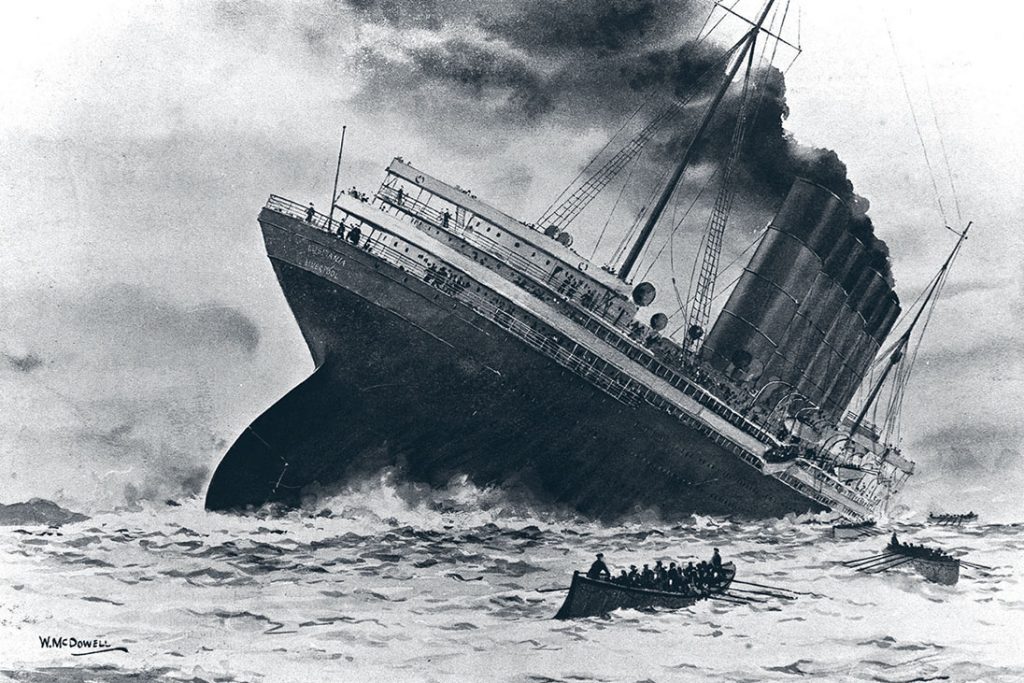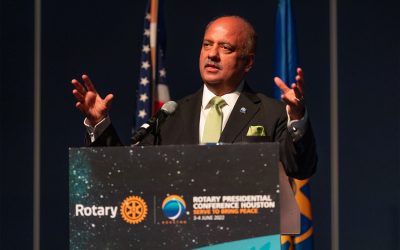“Whereas war is universally recognised as a bloody weapon handed down from a dark past … [Rotary should] lend its influence to the maintenance of peace among the nations of the world without recourse to war.”
So resolved the nearly 1,300 Rotary members who gathered at Houston’s Municipal Auditorium in June 1914 for the fifth annual convention of the International Association of Rotary Clubs.
The Rotarian published the entire 183-word resolution in its August issue. But by then, the dominoes had fallen.
On June 28th, 1914, two days after the convention adjourned, a 19-year-old Bosnian Serb named Gavrilo Princip assassinated Archduke Franz Ferdinand of Austria and his wife, Sophie, in Sarajevo.
On August 4th, Germany invaded Belgium, and within weeks, Germany and its ally, Austria-Hungary, were at war with France, Great Britain, Russia, and Serbia.
The lamps had gone out all over Europe.
Buffered by the Atlantic Ocean, American Rotary members were at first only indirectly affected by the war.
At the Houston convention, a Texas Rotary member named R.C. Duff captured the mood that would prevail throughout the American branch of the organisation for at least another year.
Duff delivered a paean to business — “honourable, energetic, wealth-producing commerce, trade and industry” — as “the panacea to war.”
In the October issue of The Rotarian, L.D. Hicks, a founding member of the Atlanta Rotary, introduced a catchphrase: “Don’t talk war, talk business.”
In their hands-off stance, these Rotary members mirrored President Woodrow Wilson, who on August 4th had issued a proclamation of neutrality.
“The United States must be neutral in fact, as well as in name,” he said two weeks later in a message to Congress.
“We must be impartial in thought, as well as action.”
American Rotary members anticipated that the distant perch from which they observed the “slaughter of humanity” fit them for a special role.
“Let us, as Americans, do what we can,” pleaded Minneapolis Rotary.
“We must not take sides. We cannot interfere. But we can give to the voice of peace a volume that will penetrate the confusion of the most impassioned battle.”


An illustration shows the Lusitania sinking off the coast of Ireland.
Calls for Rotary to serve as peace advocates came from outside the organisation as well.
In a September speech to Houston Rotary, writer and publisher Elbert Hubbard deemed Rotary “the greatest business organisation in the world” and urged it “to lend its powerful influence toward universal peace.”
In 1914, Hubbard enjoyed a fame surpassed by few other Americans.
With his shaggy mane, broad Stetson, baggy overcoat, and flowing cravat, he cut a distinctive figure, and he backed up his celebrity with prodigious output that included lively monthly magazines — most notably, The Philistine, his “periodical of protest” — and wares produced at Roycroft, his arts and crafts community near Buffalo, New York.
On May 7th, 1915, Hubbard and his wife, Alice, were aboard the Lusitania near the coast of Ireland when a German torpedo ripped through the ship’s bow.
The Lusitania sank within minutes.
The Hubbards were among the nearly 1,200 dead — as was William Mitchelhill, a 44-year-old seed wholesaler from St Joseph, Missouri, whose Rotary club memorialised him as “a man of unequalled personality, particularly known for his friendship, charity and love for his fellow men.”
The sinking of the Lusitania brought the war home to Americans.
The bloodiest war that the world has ever seen is going on today, where men are killing one another as the savages did in the dark ages.”
Frank Higgins captured that changing mood when he spoke at the sixth Rotary Convention, held in San Francisco in July 1915.
One of Rotary’s vice presidents, Higgins was also president of Victoria Rotary, British Columbia.
As part of the British Empire, Canada had already been at war for nearly a year.
The world, Higgins lamented, beneath its “veneer of culture, education and refinement,” remained as brutally base as ever.
“This is borne out,” he said, “by the fact that the bloodiest war that the world has ever seen is going on today, where men are killing one another as the savages did in the dark ages.”
Higgins feared that “the doctrine of peace and goodwill to all men will remain an aerial nothing” — unless “some uplifting force is injected into the world.”
Rotary, he believed, was “that spirit, that force … ever swelling in volume and increasing in strength.”
Don’t miss!
Historian David Fowler marks 100 years of the Armistice in December’s issue of the Rotary GBI magazine.










